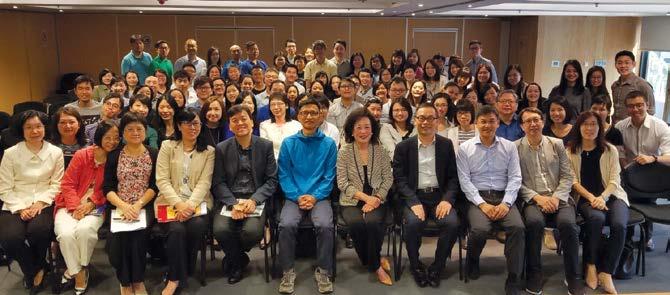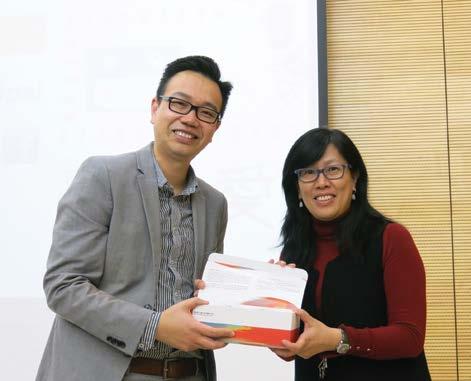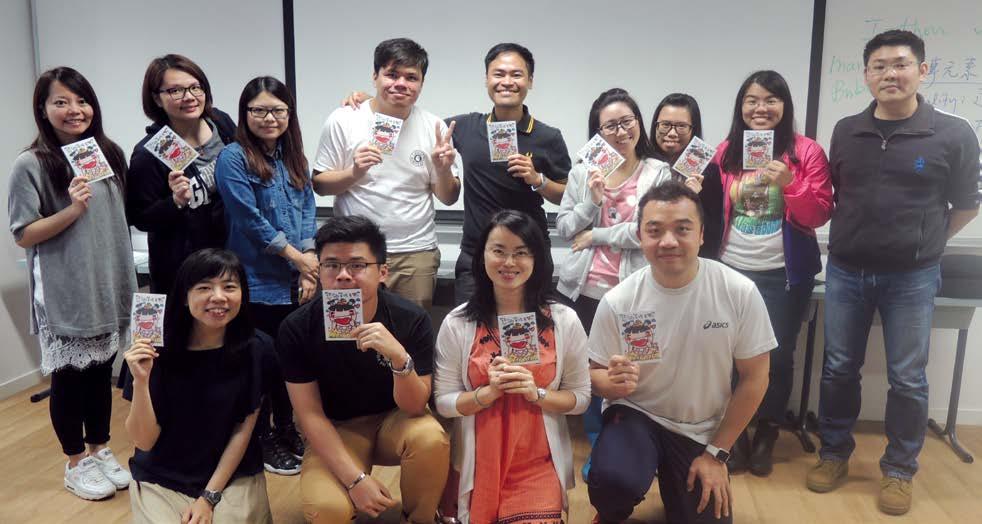
3 minute read
DEVELOPMENT AND SUPPORT
Corporate Planning and Staff Training
The Annual Plan 2017-18
Advertisement
The annual planning exercise was initiated by the senior management in November 2016 to set out the strategies and priorities in 2017-18. This was followed by a thorough discussion with staff members to review the overall performance of the past year, as well as to formulate new plans of service development, which were based on the four strategic directions of the Third Five Year Plan:
· Professionalism and Innovation

· Engagement and Participation

· School and Community Networks
· Efficiency and Resources
The main focus of the Federation continues to be in enhancing the experience of service users and providing professional services through the use of technology.
Key Performance Indicators and strategic plans of the 12 Core Services were then devised in accordance to comprehensive discussions among staff and feedback collected from service users and stakeholders.
The Annual Plan 2017-18 was finalised and published in March 2017, with copies distributed to government departments, funding bodies, partners, youth work organisations, universities and schools.
Staff Training
In year 2016-17, 650 staff members accomplished a total of 11,882 training hours by attending 112 in-house and 147 external training activities, achieving a total attendance of 4,474. Highlights of staff training programmes include:
Enhancing ICT Competence

A series of basic ICT training programmes, lasting for six months, was organised to consolidate ICT skills, including online tools applications, as well as making videos with mobile phones, micro-movie production and media post production skills. The importance of internet security was also a focus. Training related to understanding Big Data applications, O2O marketing and effective communication, along with familiarity with social media trends and marketing, and the trends in new media were also part of enhancing ICT competence.
Professional Capacity Building
Cognitive Behavioural Therapy (CBT) is the required basic training for social workers, especially in youth crime prevention and counselling. An intervention manual in how to apply CBT in counselling young people engaged in gang violent behaviour was published. Social workers also studied Narrative Therapy and how to apply this to help young people with either an addiction to the Internet or in preventive educational programmes.
Training on Values Education enabled staff to produce Values Education packages for secondary students, led to the launching of a Values Education Scheme focusing on love and sex.

Staff were also sponsored to obtain coaching licenses in running and adventure-based training. This was to strengthen professional standards of the Federation’s sports programmes. Other training programmes included, dealing with special educational needs, child protection, parenting, drug abuse and mental health.
Innovation through Exposure
Staff members were given exposure opportunities in areas of social innovation, entrepreneurship, youth leadership, sustainable development and artificial intelligence (AI).
To facilitate internal communication and encourage knowledge exchange, a new scheme, “Internal Job Experience Programme” was launched in the second half of last year. Staff members were able to visit and gain a oneday working experience in other units such as Youth S.P.O.Ts, Outreaching Social Work Team, M21, Organic Farm and the Social Innovation Centre, among others. Over 30 staff members participated in the scheme and had positive feedback about how they had their horizons broadened by working with colleagues in different service settings.

Effective Management and Communication
Maintaining effective management is one of the key areas of the Federation. Last year, human resources management and financial management training were provided to managerial staff to strengthen their leadership and management skills. A Business Writing Workshop was organised to solidify their knowledge on effective communication skills. Administrative staff were also sponsored to obtain training on occupational safety to ensure a safe working environment for everybody.
Formal Social Work Programmes
Staff members who were studying in formal social work programmes leading to High Diplomas, Associate Degrees, Bachelor’s or Master’s Degrees, were granted study leave to complete their fieldwork placements in their serving units. In the past academic year, two staff members completed their agency-attached placements as part of the requirement in attaining their professional qualification. In the 2017-18 academic year, six staff members were granted study leave to undertake agency-attached placements.
Staff e-Learning System
There were over 10,000 logins by staff in the Staff e-Learning System in 2016-17. The platform enabled staff to register, make approvals, return feedback forms and submit learning reports in a paperless manner which simplified administrative procedures. This method was also more effective for data input and analyses regarding staff training statistics. This entire process resulted in higher efficiency in moving towards the “GoGreen” policy of the Federation.
All new staff underwent a series of induction training programmes within their first three months, mostly through the e-classroom programmes with materials and online exercises. It helped new staff members understand the organisational culture and policy of the Federation without time and geographical constraints. 83% of the new staff members completed their online induction training last year.
“eConnect”, an e-newsletter for staff, is published three times a week which includes feature articles about the latest news and trends on youth, organisational messages and topical columns ranging from ICT, innovation, school youth work to sustainable development.










